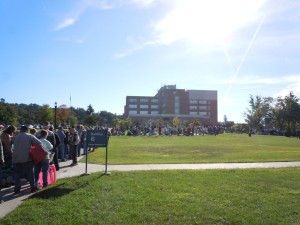

September 4, 2014 — Iron Mountain, Michigan — On Sept. 3, 2014, Feeding America West Michigan Food Bank coordinated its largest Mobile Food Pantry in history at the VA Medical Center in Iron Mountain.
Two semi trucks filled with 40,000 pounds of food were escorted to the site by a dozen bikers with the Michigan Patriot Guard. Sponsored by the Riders and the Escanaba Seventh Day Adventist Church, the food distribution was open to veterans, current service members, and their families.
“It was overwhelming,” said Robin Wycoff, coordinator of the church’s hunger-relief program and a member of the Patriot Guard. Wycoff says over 1,000 households were served.
“There’s a big need up here,” Wycoff said. “This is something we wanted to do to show appreciation for what they’ve done.”
According to a recent study, one quarter of the households Feeding America West Michigan serves are military families, higher than the national average.
That statistic doesn’t surprise Leonard Newlin, who was one of the first to show up. An Army veteran who served during the Vietnam War, Newlin says homelessness among veterans in the area is not uncommon. He worries too about young veterans coming back from war with health problems, both visible and invisible.

“Myself, I struggle with depression, and I see a lot of young guys going up to talk to the counselor,” Newlin said. “I’ve seen a lot of them that have really seen some bad stuff, and it really throws them for a loop.”
Since losing his job as a veneer grader at a local mill several years ago, Newlin says this isn’t the first time he’s needed help getting food. “Right now I’m just at a point where it’s the third [of the month], and I think I’m overdrawn already.”
Some of the veterans in attendance completed their service 50 years ago, others just this year.
Jonathan and Elizabeth Alba, Army veterans from Escanaba, waited two hours to pick up cabbage, watermelon, PopTarts, yogurt and tomatoes. The couple met while serving in the same battalion in Texas and were recently married.
Both discovered that reentering civilian life was harder than advertised. Jonathan, a self-described “door-kicker” with the infantry, teaches mixed martial arts while Elizabeth, trained as a combat medic, found her job prospects unexpectedly limited after sustaining a head injury that causes fainting spells. She learned to read Braille and now transcribes books for visually impaired students.
“I’m lucky to know Braille because I can’t do what I did before,” she said.
Jonathan says they try to live by the principle he instills in his students: “If it means something to you, you’ll make time. If it means nothing, you’ll make an excuse.”
“We’re doing what we can with what we have,” he said.
Demand for the church’s food assistance services isn’t limited to veterans. Thousands in the region struggle to get enough to eat, and Wycoff says the church is currently raising money to expand their food pantry in Escanaba. Feeding America West Michigan has likewise seen an increase in demand, with food distributions to the Upper Peninsula growing 11 percent last year.
